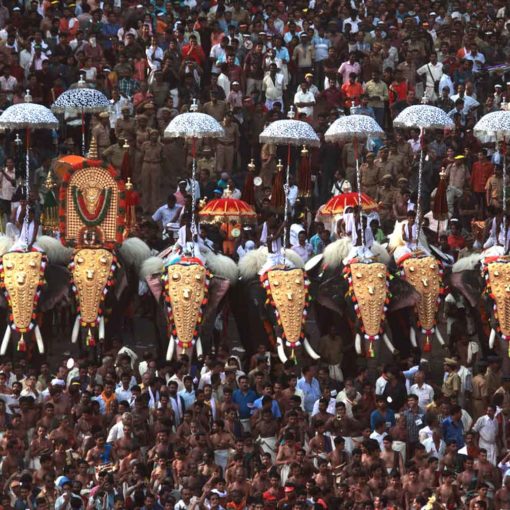A visa is one mode of permission or certification that is issued by the immigration authority of a country to a non-citizen to enter, travel and stay on that particular country for a limited period. Travelling to a different country without prior permission from the immigration officer is considered a punishable offence.
To enter India, the neighboring citizens of Nepal and Bhutan don’t need to follow this procedure as they can freely enter to this nation. There are several types of visas; our guide to Indian visas will help you to know about all types of Indian Visas and the obtaining procedure.
1. Tourist Visa:
This is a special type of visa, which is only issued to the people who come to India for sightseeing and touring purpose. Tourist visa is issued for only 6 months (180 days) and it is valid from the date of issue. This visa is not transferable and non-extendable and can never be used for any other purposes like business, education, social work, etc. Those who are occupying six-month multi entry visa, they cannot return to India before 2 months gap. Foreigners who are very frequent to India e.g. travel agent; they can possess one-year multi entry visa registering with Foreigners Regional Registration Office (FRRO), but they are also permitted to the nation in a gap of 2 months.
2. Transit Visa:
Transit visa is granted to the people who transit through India to other destination. This visa is valid only for 15 days from the date of issuance and one can stay maximum 3 days on each transit. Before applying for this visa, one need to execute his/her travel plans by way of valid air tickets for onward journey via India. If someone becomes unable to visit India within these 15 days, he/she can apply for another transit visa.
3. X Visa:
Citizens of Indian origin holding foreign passport can apply for X visa. These people cannot be issued a tourist visa. X visa is only provided to the following category of people:
- A foreigner, but Indian origin
- Children and spouse of a foreigner of Indian citizen or Indian origin
If necessary, people of Indian origin can extend X visa and there is no hard and fast rule that one have to subject to the two months gap to visit India. But one cannot get work permit on this visa.
4. Business Visa:
Business visa is issued to those foreigners who wish to explore business opportunities and establish joint ventures in India. This visa is generally valid for six months, but if one wishes to extend the days, then he/she needs to register with Foreigners Regional Registration Office (FRRO) within 14 days of arrival in India.
5. Student Visa:
Student visa is granted to those students who come to India to pursue regular studies at a recognized educational institute. The study may be for Yoga, Indian system of dance and music, Vedic Culture, etc., but one need to pursue it from designated institutions. The visa will be valid till the period of study and they should be approved by those institutions in India.
6. Journalist Visa:
People who works as a professional journalist or a photographer or a film maker and want to access a particular region or a person in India, only they are liable to apply for Journalist visa. This visa is valid for only three months and it doesn’t concern about their purpose of visit. It is really very tough to get such visa; apply for the same while you truly need it.
7. Conference Visa:
Personal, who has got an invitation from an Indian government organization to take part in an International conference/workshop/seminar, only they can apply for conference visa. But, if someone is coming to India to attend a conference with a private organization, they can not apply for conference visa; in such case they would apply for business visa.
8. Research Visa:
This visa is only granted to a scholar or professor or to the people who wish to visit India for research related purpose. Research visa is granted for three years or up to the duration of the research project. One needs to take prior permission from the Foreigners Regional Registration Office (FRRO) within 14 days of arrival in India if plan for staying in the nation extends beyond 180 days.
9. Medical Visa:
Patient who is suffering from serious disease and seeks medical treatment in India at a specialized and recognized hospital, only he/she along with two medical attendants are allowed to apply for Medical visa. Certification form the Indian consulting doctor for the treatment is must for the same. If the treatment takes more than 180 days then one need to serve prior registration to the Foreigners Regional Registration Office (FRRO) within 14 days of arrival in India.
10. Employment Visa:
Employment visa is provided to a foreigner who wishes to work with an Indian company, duly registered by the Government of India. This visa is granted for maximum of two years or less and he must be recruited for a specialized position in that particular company with the minimum salary of USD 25000 per annum.
One can apply for a fresh employment visa while there is a need to change the employer and it should be acquire from the Indian Mission in their country of origin of the applicant.
Documents Required for Visas:
- Duly filled and signed Visa application form (for all types of visas)
- One recent passport size photograph (for all types of visas)
- Original Passport; valid for not less than 180 days. Make sure to keep some blank pages in it. (for all types of visas)
- Come with Bank Draft with requisite Visa fees favoring ‘Embassy of India, Dublin’. Fees are also acceptable through postal order (for all types of visas)
- Bank statement or recent utility bill; having printed name and address of the applicant on it.
- Copy of confirmed air ticket for onward journey. (for transit visa)
- Proof of employment contract/relevant letters from the hospital with detailed terms and conditions as offered by the Indian Government authorized company/institute/agency/hospital, which should be duly signed by both employer and applicant/voluntary worker etc. (for employment, project entry medical, journalist and conference visa)
- Professional expertise and educational qualification proof. (for employment visa)
- Evidence of financial resources. (for research visa)
- Submission of subject of research along with the application (for research visa)
- Admission letter from a recognized Indian educational institution with the details about the course name, duration, fees, etc. (for student visa)
- Document showing financial support for the tuition fee and stay in India. (for student visa)
- No objection letter from Parents of applicant to study abroad for applicants below 18 years. (for student visa)
How much do visas cost?
The cost for visas varies between countries to countries according to the Governments. For some countries it costs high, for some it costs less and some countries (like Afghanistan, Bangladesh, Argentina, Jamaica, Democratic People’s Republic of Korea, Maldives, Mongolia, Mauritius, South Africa and Uruguay) don’t need to pay any visa fees.
Note:
- Visa fees are non-refundable
- Once visa is issued, you cannot make any alteration and changes on it.
- If child is traveling with parents there is not reduction of visa fees for them and their name should be mentioned on parent’s passport.
How one can apply for Indian Visa?
To make visa application process more efficient, Indian Embassy already has started outsourcing this method in different countries through some private processing agencies. In United States visas for India are issued by Travisa Outsourcing and for other countries like Sri Lanka, Thailand, United Kingdom, France, Australia and China one can approach to VFS Global.
Visa forms can be available from the Indian Embassy in your country; go by self or if not you can fill an online visa application from the website of one of such visa processing agencies.
After filling up the application form, you need to submit your passport which should have a validity of minimum six months. Leave two blank pages inside it and along with your recent passport size photo, application fee and detailed itinerary just handover to them.
Please contact us for more current and updated information.




